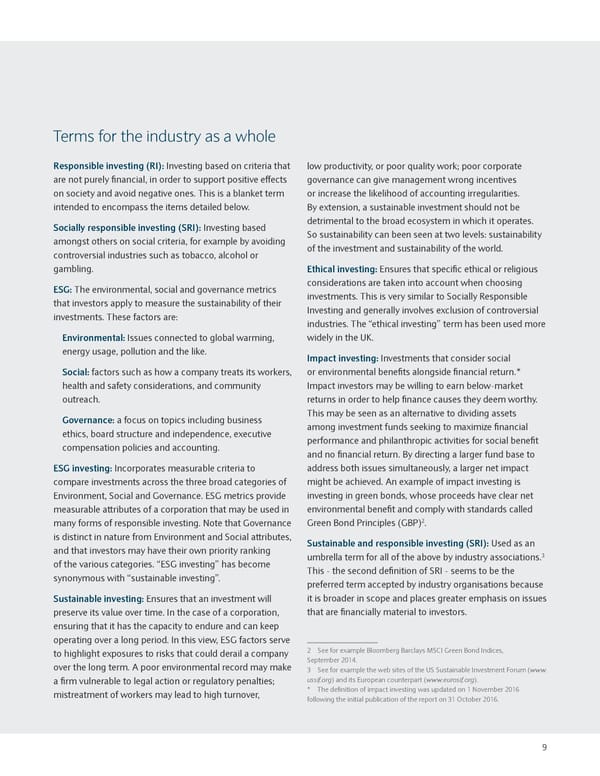Terms for the industry as a whole Responsible investing (RI): Investing based on criteria that low productivity, or poor quality work; poor corporate are not purely financial, in order to support positive effects governance can give management wrong incentives on society and avoid negative ones. This is a blanket term or increase the likelihood of accounting irregularities. intended to encompass the items detailed below. By extension, a sustainable investment should not be Socially responsible investing (SRI): Investing based detrimental to the broad ecosystem in which it operates. amongst others on social criteria, for example by avoiding So sustainability can been seen at two levels: sustainability controversial industries such as tobacco, alcohol or of the investment and sustainability of the world. gambling. Ethical investing: Ensures that specific ethical or religious ESG: The environmental, social and governance metrics considerations are taken into account when choosing that investors apply to measure the sustainability of their investments. This is very similar to Socially Responsible investments. These factors are: Investing and generally involves exclusion of controversial industries. The “ethical investing” term has been used more Environmental: Issues connected to global warming, widely in the UK. energy usage, pollution and the like. Impact investing: Investments that consider social Social: factors such as how a company treats its workers, or environmental benefits alongside financial return.* health and safety considerations, and community Impact investors may be willing to earn below-market outreach. returns in order to help finance causes they deem worthy. Governance: a focus on topics including business This may be seen as an alternative to dividing assets ethics, board structure and independence, executive among investment funds seeking to maximize financial compensation policies and accounting. performance and philanthropic activities for social benefit and no financial return. By directing a larger fund base to ESG investing: Incorporates measurable criteria to address both issues simultaneously, a larger net impact compare investments across the three broad categories of might be achieved. An example of impact investing is Environment, Social and Governance. ESG metrics provide investing in green bonds, whose proceeds have clear net measurable attributes of a corporation that may be used in environmental benefit and comply with standards called many forms of responsible investing. Note that Governance Green Bond Principles (GBP)2. is distinct in nature from Environment and Social attributes, Sustainable and responsible investing (SRI): Used as an and that investors may have their own priority ranking 3 of the various categories. “ESG investing” has become umbrella term for all of the above by industry associations. synonymous with “sustainable investing”. This - the second definition of SRI - seems to be the preferred term accepted by industry organisations because Sustainable investing: Ensures that an investment will it is broader in scope and places greater emphasis on issues preserve its value over time. In the case of a corporation, that are financially material to investors. ensuring that it has the capacity to endure and can keep operating over a long period. In this view, ESG factors serve to highlight exposures to risks that could derail a company 2 See for example Bloomberg Barclays MSCI Green Bond Indices, over the long term. A poor environmental record may make September 2014. 3 See for example the web sites of the US Sustainable Investment Forum (www. a firm vulnerable to legal action or regulatory penalties; ussif.org) and its European counterpart (www.eurosif.org). mistreatment of workers may lead to high turnover, * The definition of impact investing was updated on 1 November 2016 following the initial publication of the report on 31 October 2016. 9
 Sustainable Investing and Bond Returns Page 9 Page 11
Sustainable Investing and Bond Returns Page 9 Page 11